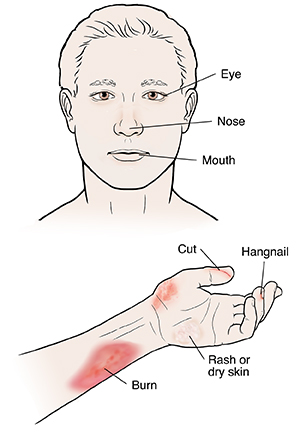A
B
C
D
E
F
G
H
I
J
K
L
M
N
O
P
Q
R
S
T
U
V
W
X
Y
Z
Topic IndexLibrary Index
Click a letter to see a list of conditions beginning with that letter.
Click 'Topic Index' to return to the index for the current topic.
Click 'Library Index' to return to the listing of all topics.
Understanding Bloodborne Pathogens
Blood or body fluids may have germs (pathogens) that can cause disease. If there's an accident at work involving blood or body fluids, these germs can spread. The most common and serious bloodborne germs are the hepatitis B virus (HBV), hepatitis C virus (HCV), and human immunodeficiency virus (HIV). Once these germs infect you, you may become sick. In turn, the germs may spread to your loved ones. The 3 bloodborne germs described below are the most common causes of infections in the workplace.
 |
| Disease-carrying blood or body fluids can enter through any body opening or break in skin. If they do, you may become infected with disease. |
Hepatitis B virus (HBV)
-
HBV can cause severe damage to the liver. It can even lead to death.
-
A vaccine is available to help prevent HBV infection. This vaccine is given as 3 shots over a period of time.
-
Adults who aren't vaccinated and are exposed at work to another person's blood or body fluids can be given medicine or a vaccine after the exposure. This helps prevent infection from developing.
Hepatitis C virus (HCV)
-
Like HBV, HCV can cause severe damage to the liver. It can lead to death.
-
There's no known vaccine for HCV.
Human immunodeficiency virus (HIV)
How bloodborne diseases infect you
Bloodborne diseases can infect you when:
-
You help an injured person without using a protective barrier between you and the infected person's blood or body fluids.
-
An object or surface with infected blood or body fluids on it touches your broken skin.
-
You touch your eyes, nose, or mouth with your hands, which have infected blood or body fluids on them.
-
You're pricked or scratched by a sharp object, such as broken glass or a needle, that has infected blood or body fluids on it.
Online Medical Reviewer:
Chad Haldeman-Englert MD
Online Medical Reviewer:
Marianne Fraser MSN RN
Online Medical Reviewer:
Raymond Kent Turley BSN MSN RN
Date Last Reviewed:
1/1/2022
© 2000-2024 The StayWell Company, LLC. All rights reserved. This information is not intended as a substitute for professional medical care. Always follow your healthcare professional's instructions.